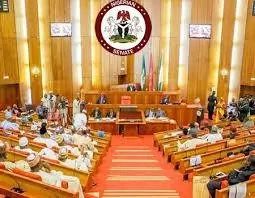President of the Senate, Ahmad Lawan, has said that the National Assembly would mount more pressure on revenue generating agencies to ensure that they remit N1 trillion naira in revenues annually to enable the federal government fund its budget.
Lawan stated this in his remarks after the chamber approved President Muhammadu Buhari’s submission of the revised 2022-2024 fiscal framework.
The Senate President explained that generating more revenues through the agencies will reduce government’s deficit and dependence on external borrowing to fund the country’s national budget.
He noted that increased revenue can be realized, if the Executive and Legislature collaborate to ensure that revenue generating agencies remit all monies collected to the treasury.
He said, “I’m sure that those MDAs that remitted N400 billion could possibly have remitted N1trn naira, if we had pushed harder.
“So, we need to push harder because what this means is a revelation, that many of these MDAs have been cornering funds that ordinarily should have gone to the treasury.
“But for many years, they have been taking the funds unfairly and illegally. So, we should not be content with only N400 billion naira.
“It is a good thing that it happened, because that is an exposure of what they have been doing.
“But we must insist that it goes beyond the N400 billion naira. I’m sure we can get even more than N1 trillion.
“I agree that we need more revenues, so that we are able to fund our budget with less deficit.
“But we can only achieve that if the Executive and Legislature work hard to ensure that the revenue generating and collecting agencies perform their jobs very well and remit the funds to the treasury.”
Speaking on government’s resort to external borrowing, Lawan said, “I also agree that the deficit or the borrowing is a bit high.
“But then again, the choice is limited, because on one breadth we cannot say that we will not borrow because it is becoming too much, when we don’t have ways and means of funding infrastructural development in the country.
“[And] we cannot say we should just fold our arms and not do anything because the country will never move. So, it’s a catch-22 situation.
“I believe that we need to be very mindful that we need to reduce the borrowing, but that means we have to improve on the revenue that we receive.
“I believe that the additional revenues that have not been captured like the TETFUND, Bank of Industry and so on, were before just left out of the federal budget. Now, we can see everything, and we need to see more.”
Contributing to the debate on the revised 2022-2024 fiscal framework, Senator Chukwuka Utazi (PDP, Enugu North) advised the federal government to take seriously the issue of diversifying the Nigerian economy.
The lawmaker harped on the need to explore alternative revenue sources such as mining to boost the country’s revenue figures, warning that “the time of oil is over”.
Senator Betty Apiafi (PDP, Rivers West) described the government’s decision to jerk up the 2022 budget projection from 13.98 trillion to N16.45 as over ambitious and a proposal taken too far.
She added that one of the major challenges confronting the national budget is the absence of funds appropriated for under-recovery.
“No matter how much you get in terms of revenue, and we are really struggling, under-recovery can wipe that out”, the lawmaker said.
Apiafi called for sanctions on any Ministry, Department and Agency of Government found to have violated the provisions of the Appropriations Act.
She insisted that the sum of N510 billion for Service Wide Vote in the 2022-2024 revised framework was “outrageous”, adding that the National Assembly must be given a breakdown on how the amount would be used by the executive.
Meanwhile, a total of six bills on Wednesday scaled second reading in the Senate.
The bills are: Disaster and Risk Management Council of Nigeria Bill, 2021; Federal Capital Territory University of Science and Technology Abaji (Establishment) Bill, 2021; and Microbiology Council of Nigeria Bill, 2021.
Others are the Federal Eye Centre, Ochadamu Bill, 2021; A bill to Repeal the Legal Practitioners Act, 2004; and the Legal Education Act (Amendment) Bill, 2021.
The bills were referred by the Senate President, Ahmad Lawan, to the Committees on Establishment and Public Service; Tertiary Institutions and TETFUND; Health (Secondary and Tertiary); and Judiciary, Human Rights and Legal Matters.
The Committees were all given four weeks to report back to the upper chamber.
In a related development, President Muhammadu Buhari’s request for the confirmation of Engr. Farouk A. Ahmed as Chief Executive Officer of the Board of the Nigerian Midstream and Downstream Petroleum Regulatory Authority was referred by the Senate President to the Committee on Petroleum Resources (Upstream).
The Committee is expected to report back in four weeks.
Also referred was the President’s request to confirm Hon. Justice Husseini Baba Yusuf as Chief Judge of the FCT High Court, Abuja.
The request was referred to the Committee on Judiciary, Human Rights and Legal Matters, for it to also report back in four weeks.



